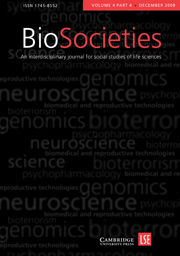Article contents
The Flesh Made Word: Banking the Body in the Age of Information
Published online by Cambridge University Press: 13 March 2006
Abstract
The John Moore case in the United States and the Alder Hey scandal in Britain raised many urgent questions about the legal and ethical status of human tissue collections. This article intervenes in the current debates by posing an ontological question about tissue banking. The present discussions of the regulation of tissue archiving often rely upon a crisp, yet ill-defined, distinction between bodily ‘material’ and medical ‘information’, each bringing with it different legal and ethical considerations. Arguing that the distinction is actually difficult to draw and in urgent need of clarification, we propose that the term ‘information’ is too broad and vague to do the necessary work and suggest replacing it with a carefully theorized account of the precise ontological differences between material and textual resources. In the second half of the article we explore one particular case of the extraction of information from human tissues—the DNA sequence. We conclude by deploying the definitions reached in the first section in an effort to clarify some of the legal and ethical concerns about ‘genetic information’.
- Type
- Articles
- Information
- Copyright
- London School of Economics and Political Science
- 16
- Cited by




